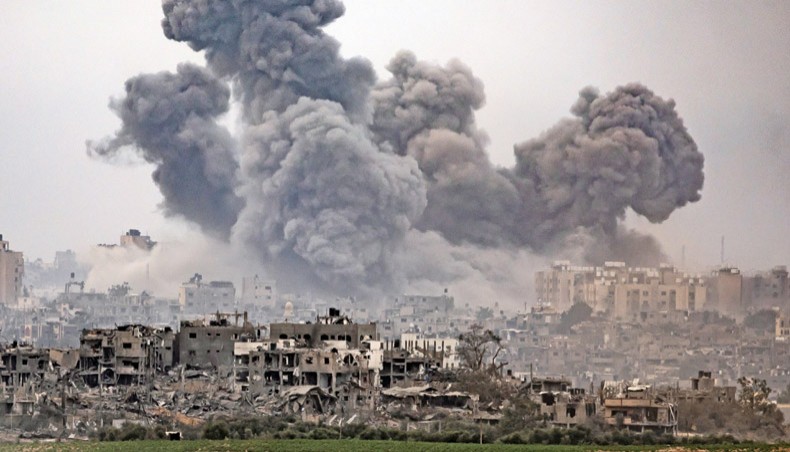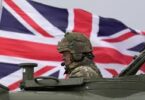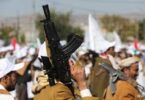GAZA (AFP): Israel pounded Hamas-ruled Gaza on Sunday in an escalating air and ground campaign as the UN warned civil order was “starting to break down” in the besieged Palestinian territory.
Israeli Prime Minister Benjamin Netanyahu steeled the nation for a “long and difficult war” ahead as the Red Cross voiced shock at the “intolerable” human suffering inside Gaza.
Despite calls for a humanitarian ceasefire and outrage across the Muslim world, Israel has intensified the war triggered by Hamas’s unprecedented attack more than three weeks ago. Hamas militants stormed across the Gaza border on October 7 in the deadliest attack in Israel’s history, killing 1,400 people, mostly civilians, and kidnapping 230 others, according to Israeli officials.
The Hamas-run health ministry in Gaza says the unrelenting retaliatory Israeli bombardment has killed more than 8,000 people, mainly civilians and half of them children.
Israel’s army said “stage two” of the war started with ground incursions since late Friday. On Sunday the military said it had struck another 450 Hamas targets within the past 24 hours, and that it was increasing its ground forces in Gaza.
In a late-night televised address on Saturday, Netanyahu announced a “second stage of the war whose goals are clear: Destroying the military and leadership capabilities of Hamas, and bringing the hostages back home”.
He vowed to “eradicate” Hamas “for the sake of our existence”.
Panic and fear have surged inside Gaza, where more than half of its 2.4 million residents are displaced, according to the UN, and thousands of buildings have been destroyed.
UN chief Antonio Guterres said the situation was “growing more desperate by the hour” as casualties increase and essential supplies of food, water, medicine and shelter dwindle. He reiterated appeals for a ceasefire to end the “nightmare”.
The UN agency for Palestinian refugees, UNRWA, on Sunday said “thousands of people” broke into several of its warehouses and distribution centres in Gaza, grabbing basic survival items like wheat flour and hygiene supplies. “This is a worrying sign that civil order is starting to break down,” it said.
Inside Gaza, where petrol and diesel have virtually run out, donkey cart driver Raafat Najjar told AFP “there are no cars, we transport (people) on carts as there’s no fuel.”
Communications went down for days after Israel cut internet lines, although connectivity was gradually returning on Sunday.
Mirjana Spoljaric, president of the International Committee of the Red Cross, voiced shock at the “intolerable level of human suffering” in Gaza and urged all sides to de-escalate.
“This is a catastrophic failing that the world must not tolerate,” she said.
Defence Minister Yoav Gallant has said Israel was attacking “above the ground and below”, alluding to Hamas’s sprawling tunnel network.
Israeli fighter jets again dropped leaflets over Gaza City on Saturday, warning residents that the northern area was now a “battlefield” and they should “evacuate immediately”.
Hamas authorities reported Sunday that a “large number” of people were killed overnight in strikes on two refugee camps in northern Gaza.
Israeli military spokesman Daniel Hagari reiterated that Palestinian civilians should go south “to a safer area where they can receive water, food and medicine”.
After 84 aid trucks entered the territory in recent days, he vowed humanitarian efforts to Gaza would expand. But Ibrahim Shandoughli a 53-year-old from Jabaliya in northern Gaza, told AFP he and his family went nowhere.
“Where do you want us to evacuate to? All the areas are dangerous.”
Netanyahu in his address also acknowledged the intelligence failure that exposed Israel to the October 7 attack that stunned and infuriated the nation. “There was a terrible failure here, and it will be thoroughly examined,” he said.
While Israel has mourned its dead, sympathy has swelled for the families whose loved ones were abducted by Hamas and are at heightened risk as the war intensifies in Gaza.
“Bring them home,” shouted relatives at a rally on Saturday.
Hamas has released four of them but this week said “almost 50” had been killed by Israeli air strikes, a claim that was impossible to verify.
Netanyahu on Saturday assured hostage relatives that Israel would “exhaust every option to bring them home”. “We demanded that no action be taken that endangers the fate of our family members, and any step considered should take into account the safety of our loved ones,” said Meirav Leshem Gonen, the mother of hostage Romi Gonen. Hamas’s armed wing, the Ezzedine al-Qassam Brigades, said it was prepared to release the hostages if Israel freed the Palestinian prisoners it was holding.
Hamas’s leader in Gaza, Yahya Sinwar, said the group was ready for an “immediate” exchange.
Ifat Kalderon, whose cousin Ofer Kalderon is believed held in Gaza along with other relatives, told AFP she supported the idea of a prisoner release in exchange for the hostages.
“Take them, we don’t need them here,” she said. “I want my family and all the hostages to come back home.” The ground operations have heightened fears that Israel’s other enemies — the Iran-allied “axis of resistance” forces in Lebanon, Syria, Iraq and Yemen — enter the conflict.
Israel’s ally the United States has warned Israel’s enemies to stay out and reinforced its military presence in the region. Skirmishes have intensified on the Israeli-Lebanese border with Iran-backed Hamas ally Hezbollah, raising fears of a new front.
Shelling in south Lebanon injured a UN peacekeeper on Saturday, the mission’s spokesman said, hours after reporting a hit at its headquarters.
Iran’s President Ebrahim Raisi on Sunday warned on X, formerly Twitter, that Israel’s “crimes have crossed the red lines, which may force everyone to take action”.
Violence has also risen sharply in the occupied West Bank since the October 7 attacks, with more than 110 Palestinians killed, according to the territory’s health ministry.







